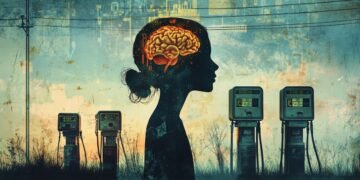In the modern landscape of mental health, the search for effective and holistic treatments continues to evolve. Western medicine, while offering pharmacological interventions, often seeks to address symptoms rather than root causes. On the other hand, Traditional Chinese Medicine (TCM), with its rich history and philosophy, offers a holistic approach that considers the body, mind, and spirit as interconnected entities. Among the various modalities within TCM, acupuncture stands out as a particularly intriguing therapy for mental health conditions. This article explores the intricate role of acupuncture and TCM theory in addressing mental health concerns, illuminating how these ancient practices can complement contemporary approaches.

The Holistic Paradigm of Traditional Chinese Medicine
TCM is rooted in the belief that health is achieved through the harmonious balance of qi (energy) flowing through the body’s meridians. These invisible pathways connect specific points on the body, facilitating the circulation of qi and blood. Mental health, according to TCM, is intrinsically linked to this energetic balance. Disruptions in qi flow can manifest as emotional, psychological, and physical imbalances, leading to various mental health disorders such as depression, anxiety, insomnia, and stress.
TCM emphasizes the importance of addressing underlying causes rather than merely suppressing symptoms. It recognizes that mental health is influenced by diet, lifestyle, emotions, environmental factors, and genetic predispositions. Treatment, therefore, involves lifestyle modifications, herbal remedies, acupuncture, qigong, and other therapeutic exercises designed to restore balance.
Acupuncture: Piercing Through the Myths
Acupuncture, a cornerstone of TCM, involves the insertion of thin needles into specific acupuncture points along the meridians. These points are believed to be energetic gateways that, when stimulated, can promote healing and balance. The practice dates back thousands of years, with ancient Chinese texts documenting its use for a wide range of conditions, including mental health disorders.
Modern research has begun to unravel the mechanisms behind acupuncture’s efficacy in mental health. Studies suggest that acupuncture may affect neurotransmitters like serotonin and dopamine, which play crucial roles in mood regulation. It has also been shown to reduce inflammation, alleviate pain, and improve sleep quality—all factors that can significantly impact mental well-being.
Acupuncture for Anxiety and Depression
Anxiety and depression are prevalent mental health issues globally. Acupuncture has emerged as a promising adjunctive therapy for these conditions. Research indicates that acupuncture can alleviate symptoms of anxiety by reducing stress hormones like cortisol and stimulating the production of endorphins, the body’s natural mood lifters.
In the case of depression, acupuncture has been found to enhance the effectiveness of antidepressant medications and even reduce the need for them in some patients. A study published in the Journal of Alternative and Complementary Medicine reported that participants receiving acupuncture in addition to standard care for depression experienced greater improvements in depressive symptoms compared to those receiving only standard care.
Harmonizing the Mind: Addressing Insomnia and Stress
Insomnia and stress are common complaints in today’s fast-paced world. TCM views insomnia as a disruption of the qi flow related to the Heart and Liver meridians, often due to emotional distress or irregular lifestyles. Acupuncture treatments targeting these meridians can help regulate sleep patterns and improve overall sleep quality.
Stress, another prevalent mental health concern, is managed in TCM by addressing its root causes, such as liver qi stagnation or spleen qi deficiency. Acupuncture treatments, combined with breathing exercises, meditation, and herbal formulas, aim to restore the smooth flow of qi, alleviate physical tension, and calm the mind.
The Role of TCM Theory in Personalized Treatment
TCM’s approach to mental health is deeply personalized, involving a comprehensive assessment of an individual’s constitutional type, current symptoms, lifestyle, and emotional state. Each treatment plan is tailored to address specific imbalances and promote individual harmony.
For instance, individuals with depression linked to spleen qi deficiency might receive acupuncture points that strengthen the spleen and improve digestion, alongside dietary advice to consume more nourishing foods. Those with anxiety related to liver qi stagnation might benefit from treatments targeting the Liver meridian, combined with stress-reducing exercises and herbs that promote liver health.
Bridging East and West: Integrative Approaches
The integration of acupuncture and TCM theory into mental health care represents a paradigm shift towards more holistic and personalized treatment strategies. Western psychiatrists and therapists are increasingly recognizing the value of these practices and incorporating them into their treatment plans.
Collaborative care models, where Western and TCM practitioners work together, offer patients a comprehensive treatment approach that addresses both physical and emotional aspects of mental health. This integration fosters a deeper understanding of mental health disorders and opens up new avenues for treatment that can be more effective and less reliant on medication.
Challenges and Future Directions
Despite its promising potential, the integration of acupuncture and TCM into mainstream mental health care faces challenges. Barriers include a lack of standardized training for Western practitioners in TCM, limited research funding, and skepticism among some medical professionals.
However, as the global mental health crisis intensifies, there is a growing urgency to explore innovative treatment options. Recent initiatives by research institutions and governmental bodies to fund studies on acupuncture and TCM in mental health hold promise for overcoming these barriers. By fostering interdisciplinary collaboration and increasing public awareness, we can pave the way for a more inclusive and holistic approach to mental health care.
Conclusion
Acupuncture and the broader principles of Traditional Chinese Medicine offer a unique and complementary perspective on mental health. By addressing the root causes of mental health disorders and promoting overall well-being, these practices provide a holistic framework that complements Western interventions. As research continues to unravel the scientific underpinnings of acupuncture’s efficacy, its role in mental health care is poised to expand, offering hope and healing to those seeking a more balanced and fulfilling life.










































